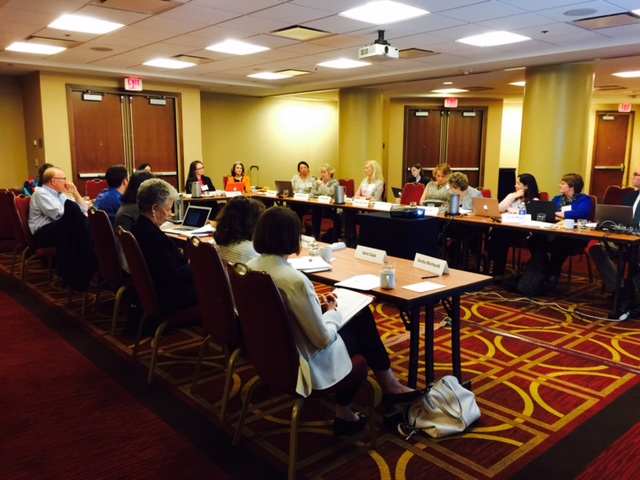The Society for Women’s Health Research (SWHR®) held its second interdisciplinary roundtable on understanding sex and gender differences in Alzheimer’s disease May 28-29, 2015 at the Hyatt Regency Crystal City in Arlington, Va.
Led by SWHR staff, including Monica Mallampalli, PhD, MSc., Vice President of Scientific Affairs, and Aimee Gallagher, MPH, MS, Scientific Program Manager, the roundtable was comprised of thirteen participants from diverse backgrounds including academia, clinical medicine, industry, and government.
Participating in the discussions were Roberta Brinton, PhD, Jeffrey Iliff, PhD, John Morrison, PhD, Kejal Kantarci, MD, MS, Pauline Maki, PhD, Duygu Tosun-Turgut, PhD, Reisa Sperling, MD, MMSc, Meryl Comer, Sara Czaja, PhD, Mary Mittelman, DPH, Darby Morhardt, PhD, MSW, Susan Resnick, PhD, and Nancy Lee, MD.
The discussions from this year’s roundtable will help to advance dialogue on the importance of sex and gender differences in Alzheimer’s disease research. Ultimately, researchers and clinicians will need to explore fundamental questions like sex differences in basic science, the importance of sex differences in the clinical presentation of Alzheimer’s disease, and the physical and financial toll on caregivers of Alzheimer’s sufferers. SWHR will to publish a white paper detailing the meeting’s discussions and recommendations and to continue the dialogue on sex and gender differences on this subject.The meeting was a follow-up to SWHR’s 2011 roundtable on sex and gender differences in Alzheimer’s disease. This year, participants explored recent advances and updates since 2011 in the areas of basic science, clinical research and psychosocial research pertaining to Alzheimer’s disease. They also delved into the biologic basis of the disease, including synaptic aging, declining hormone levels, and bioenergetic aging pathways. The clinical discussion on Alzheimer’s disease included the existence of sex-specific genetic risk factors with a particular focus on the ApoE4 gene variant as well as screening tools. Additionally, experts debated the psychosocial aspects of the disease, including caregiving and its gender-specific health consequences.
For more information about Alzheimer’s disease in women, visit SWHR.org.
